Tackling NCDs: best buys and other recommended interventions for the prevention and control of noncommunicable diseases, 2nd ed

WHO’s updated list of “best buys” and recommended interventions for addressing NCDs, aligned with the extended Global Action Plan (2013–2030) to help countries achieve the nine voluntary NCD targets and advance SDG 3 on good health and well-being.
NIH webinar highlights five years of promoting heart health at RTSL
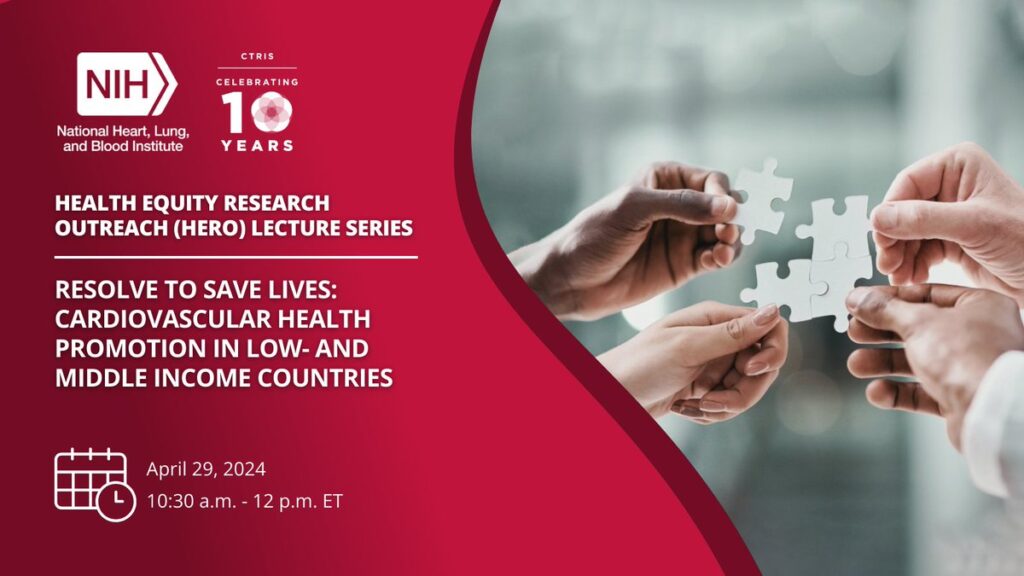
For the U.S. National Institute of Health’s HERO series, RTSL’s global health equity research takes center stage.
New IHR Benchmarks Tool simplifies planning for health emergencies

Developed in partnership with Resolve to Save Lives, this tool helps countries prepare for outbreaks and prevent epidemics.
Dr. Frieden on rebuilding trust in public health
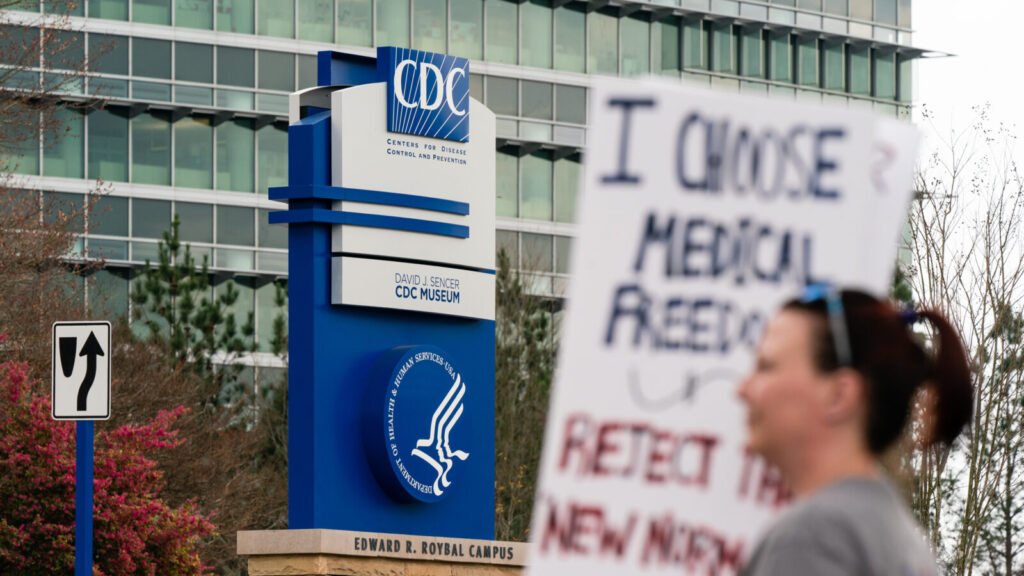
For STAT News, President and CEO of Resolve to Save Lives Dr. Tom Frieden outlines three actions that must be prioritized to restore trust.
Urban pandemic response: Survey results describing the experiences from twenty-five cities during the COVID-19 pandemic

How do local governments contribute to pandemic response? For PLOS Global Public Health, Resolve to Save Lives collaborated with colleagues at Center for Global Health Science & Security and Vital Strategies to assess government responsibilities, the timeline of response activities, challenges faced during the COVID-19 pandemic among members of the Partnership for Healthy Cities. Among […]
JHPIEGO webinar on controlling high blood pressure in primary care through HEARTS

Watch: How to integrate WHO’s HEARTS into primary health care strengthening grants
How much does it cost to treat high blood pressure?
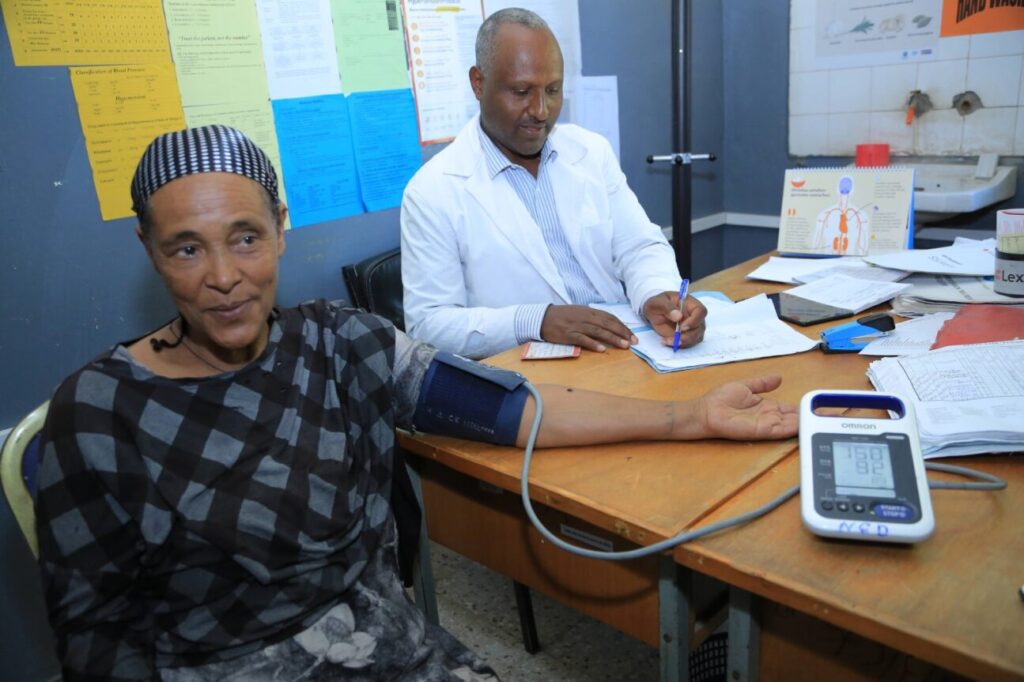
Studies in Bangladesh, Ethiopia, Mexico, Thailand and the Philippines show that implementing the WHO HEARTS package is an affordable way to improve blood pressure control and save lives.
New tool helps governments combat nutrients of concern

Watch a webinar exploring GHAI’s new Nutrient Profile Models tool for developing healthy food policies
Statement from Dr. Renu Garg: Nepal bans trans fat
STATEMENT FROM DR. RENU GARG, SENIOR VICE PRESIDENT OF CARDIOVASCULAR HEALTH AT RESOLVE TO SAVE LIVES 16 February 2024 (NEW YORK, USA)—“Congratulations to Nepal for issuing legislation that limits the amount of trans fat in food, which will save 2,200 lives each year. The new legislation, adopted with support from the World Health Organization’s South-East […]
Controlling hypertension can be the next global health win
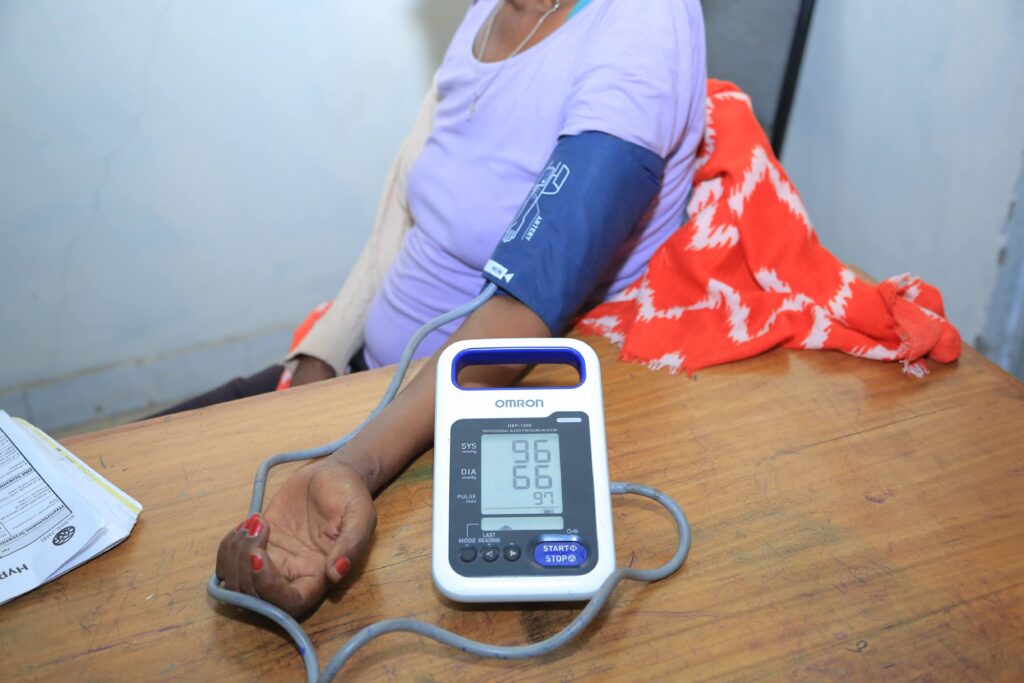
In the Washington Post, Dr. Tom Frieden calls attention to the need for increased focus and funding to prevent and treat the deadly condition.
New playbook: Designing an optimal digital tool for hypertension and other long-term treatment programs
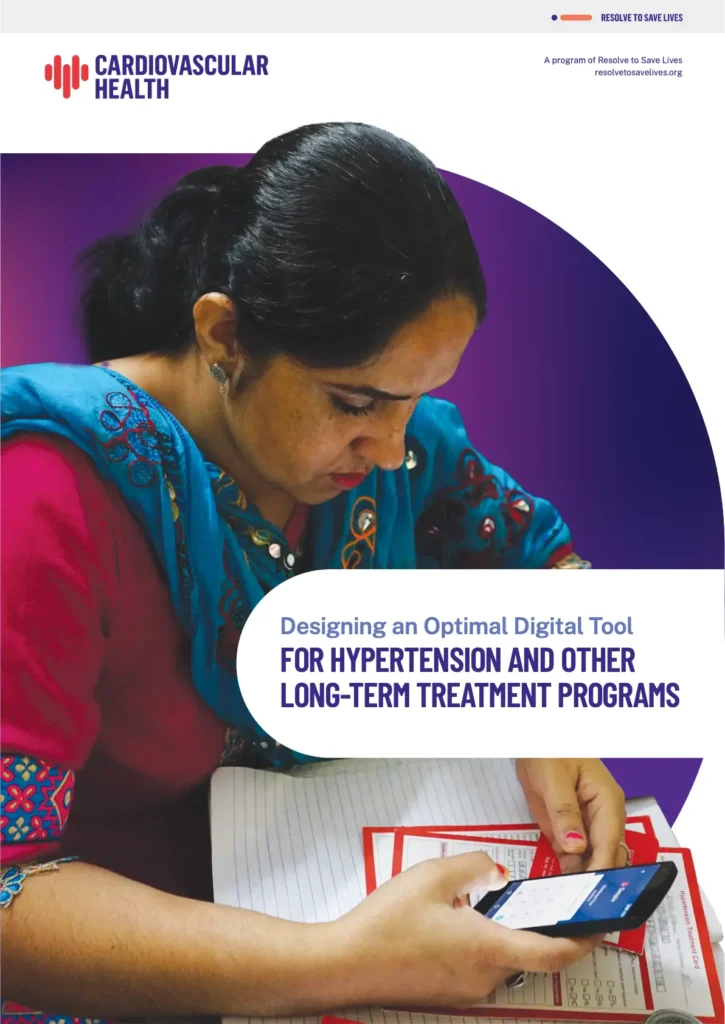
Step-by-step guidance to create or adapt an effective digital health tool—one that health care workers actually like.
Celebrating the progress and partnerships that defined 2023

RTSL’s 2023: Year in Review is our first-ever digital annual report, looking back at a remarkable year of saving lives and making the world safer from epidemics.
WHO celebrates progress against toxic trans fat with validation program
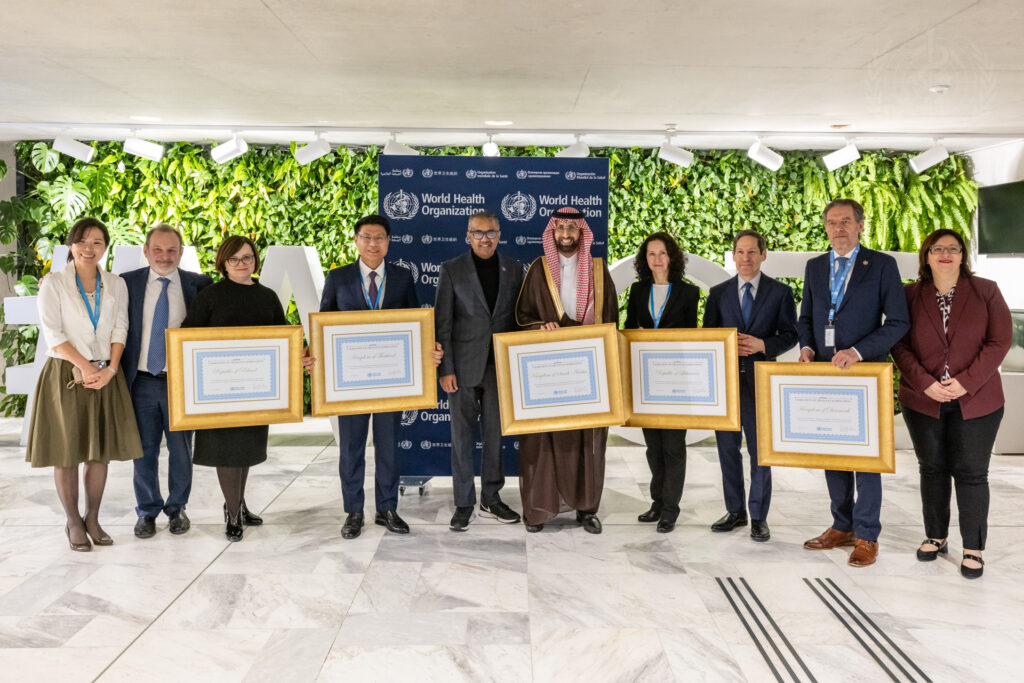
Congratulations to Denmark, Lithuania, Poland, Saudi Arabia and Thailand for their groundbreaking work helping to rid the world of this invisible killer.
Salt substitutes can help treat high blood pressure
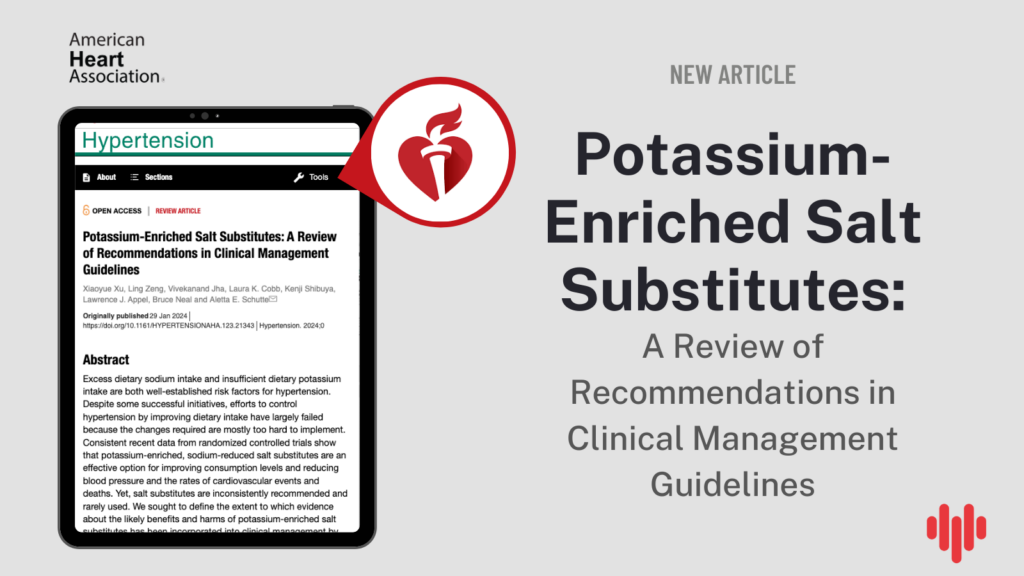
We joined international experts in the call to include salt substitutes in the treatment for high blood pressure.
Addressing the global shortage of health care workers

For CNN, Amanda McClelland proposes recommendations to address the growing global shortage of health care workers.
Trans fat stats for selected countries

Excel file with stats for selected countries including annual deaths from TFA consumption and potential lives saved between now and 2047.
WHO’s Science in 5: Everything you need to know about trans fat

Short video with WHO’s Dr Francesco Branca explaining which foods contain trans fat and how trans fats hurt us
Customizable fact sheet: Developing and Implementing a Trans Fat Elimination Policy
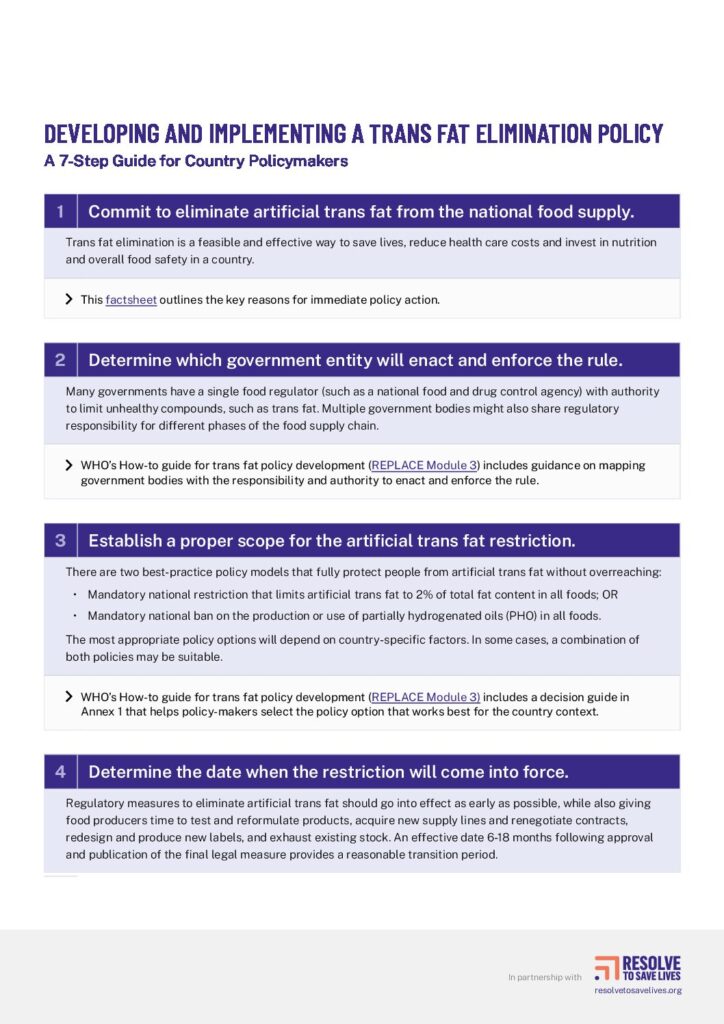
Fact sheet explaining 7 steps to developing and implementing a trans fat elimination policy. Design files available here (download).
Customizable fact sheet: Trans Fat Elimination – Reasons for Policy Action Now
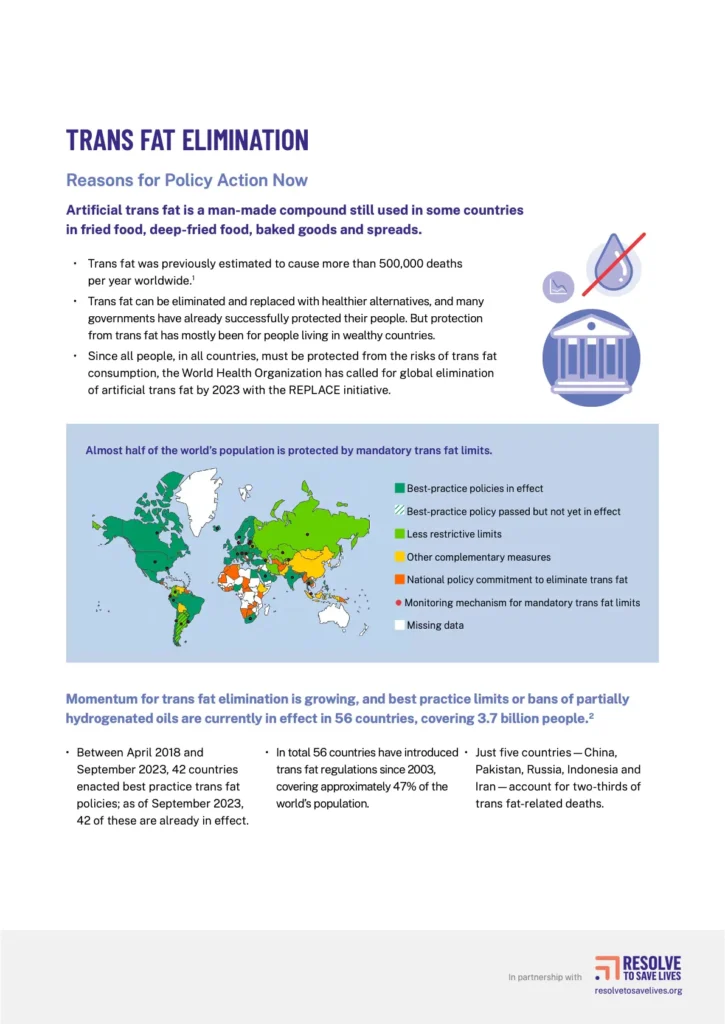
Fact sheet with key statistics and arguments for trans fat elimination Design files available here
Resolve to Save Lives Nigeria welcomes New Executive Director

NOVEMBER 20, 2023 (ABUJA, NIGERIA)—Resolve to Save Lives announced today the appointment of Nanlop Adenike Ogbureke as its new Executive Director in Nigeria. She will oversee a technical and operations staff of 11, facilitate effective coordination and implementation of program activities, as well as foster and maintain productive relationships with government and non-governmental stakeholders within […]
WHO and the 7-1-7 Alliance introduce Early Action Reviews
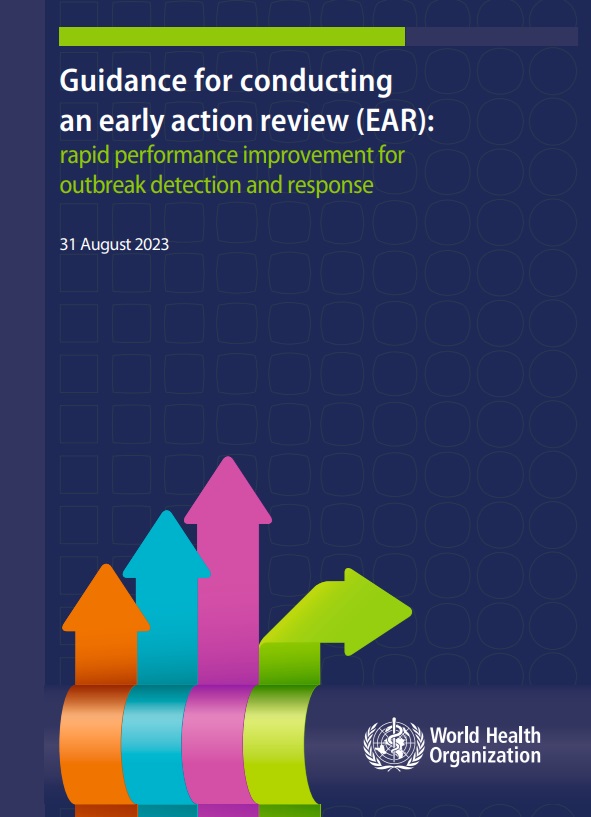
More than 500 people from 73 countries signed up to hear representatives of the World Health Organization and the 7-1-7 Alliance introduce new guidance on Early Action Reviews.
Developing technical capacity to scale up 7-1-7

The 7-1-7 Alliance hosted a training series for Atlanta-based staff of the U.S. Centers for Disease Control and Prevention. A first virtual training session introduced the 7-1-7 target, its central role in the WHO Early Action Review guidance, and how 7-1-7 fits into key components of the global health security framework. In a two-day, in-person […]
Sharing learnings to achieve the 7-1-7 target
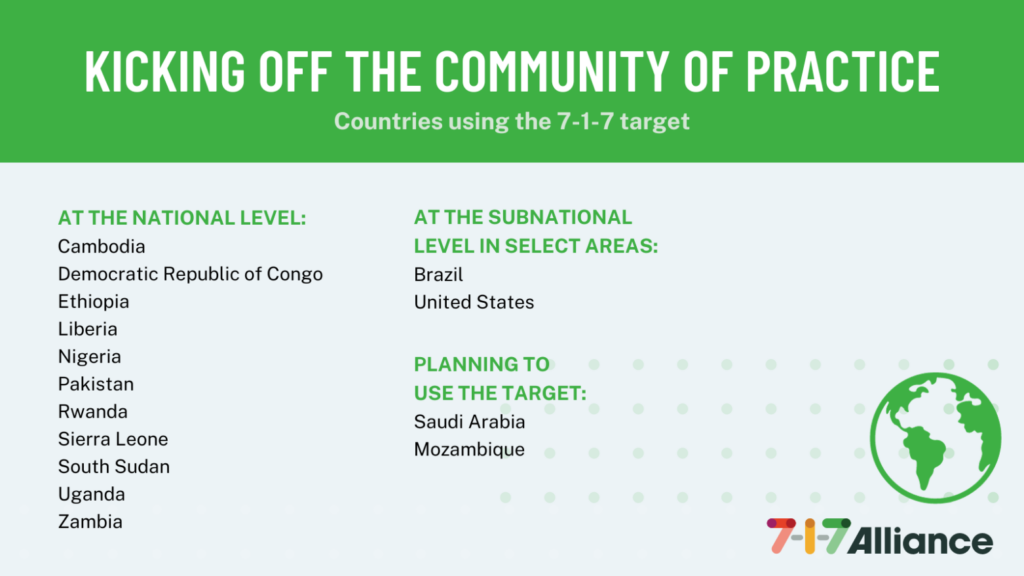
The 7-1-7 Alliance, a country-led initiative hosted by Resolve to Save Lives, formed a global community of practice with 15 implementing countries.
The Centrality of Communities and Civil Society in Epidemic and Pandemic Prevention. A Framework for Improved Preparedness and Response
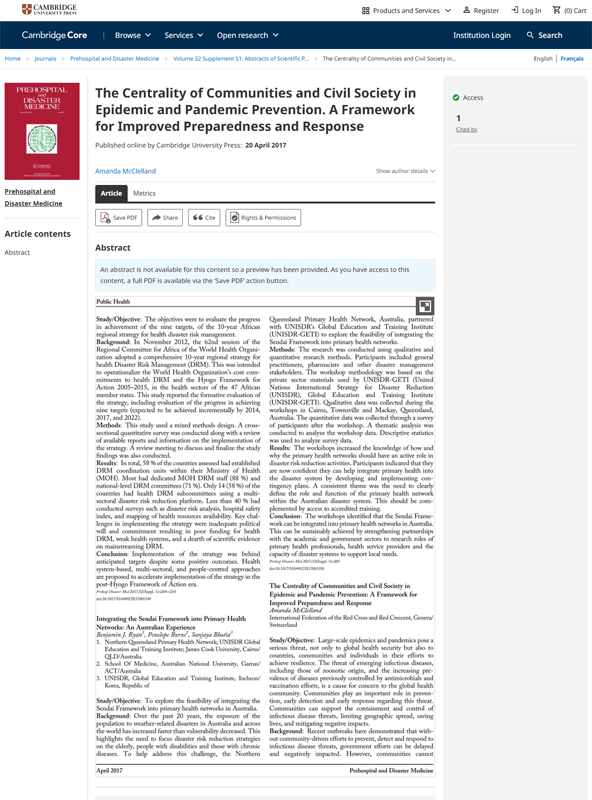
Large-scale epidemics and pandemics threaten global health security and community resilience, especially concerning emerging infectious diseases and the resurgence of previously controlled conditions. Communities play a vital role in preventing, detecting, and responding to these threats, as demonstrated in recent outbreaks. Effective community involvement enhances government efforts and mitigates negative impacts. This study emphasizes the […]
How to revitalize World Bank health spending
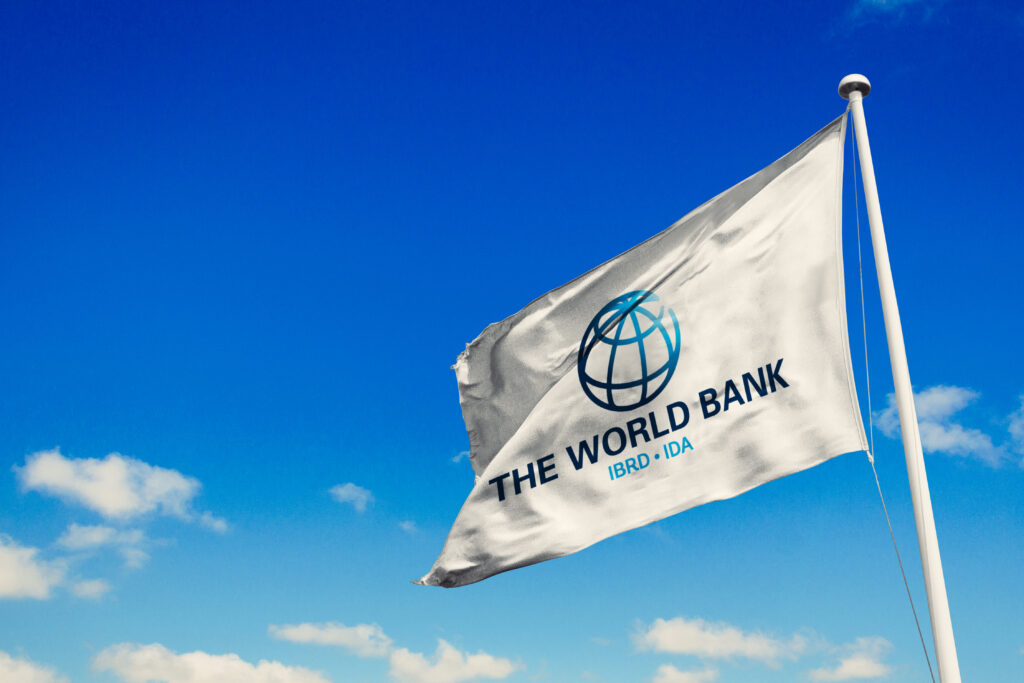
In a recent Devex column, our President and CEO Dr. Tom Frieden and Senior Advisor of Prevent Epidemics Marine Buissonniere discuss how the World Bank can strengthen its health programming—and support the countries in greatest need.
Sherif Sakr joins Resolve to Save Lives’ Board of Directors
September 26, 2023 (NEW YORK, USA)—Resolve to Save Lives (RTSL), a global health organization focused on partnering with communities and countries to prevent 100 million deaths from cardiovascular disease and make the world safer from epidemics, today announced the appointment of Sherif Sakr, partner and Chief Operating Officer of Deloitte LLP, to the RTSL Board […]
Five years of HEARTS
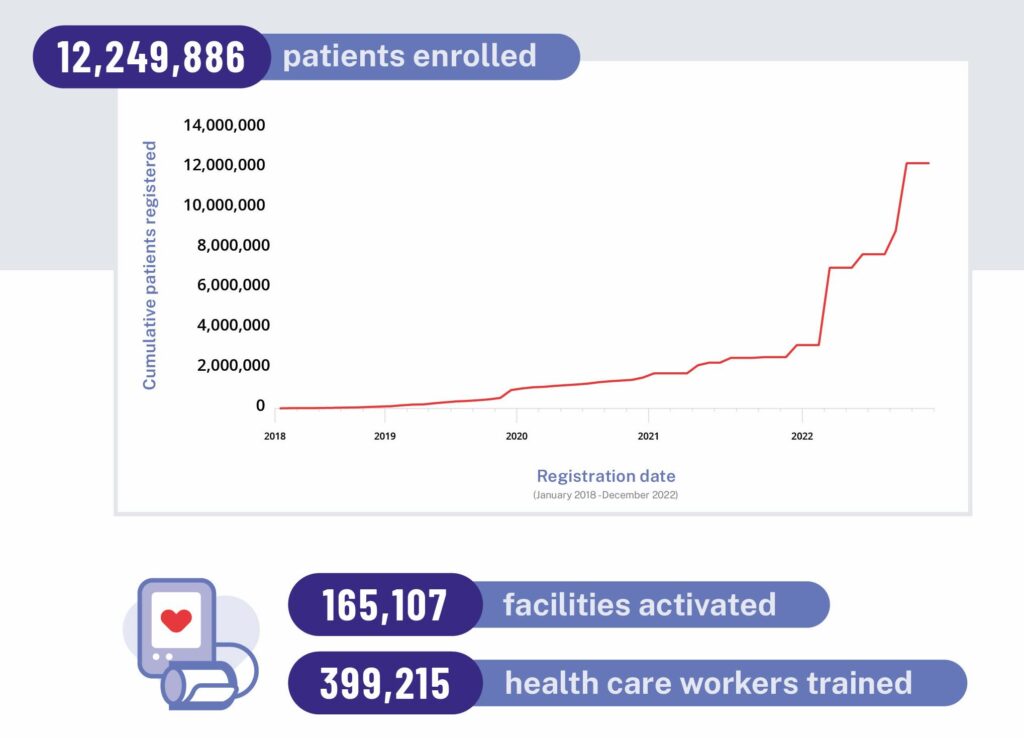
Alongside the WHO Global Hypertension report, the Journal of the American College of Cardiology (JACC) published a new report on the first five years of the Global HEARTS Initiative, a partnership between the WHO, Resolve to Save Lives, and the governments of 32 low- or middle-income countries. HEARTS programs work for hypertension patients, and we […]
First WHO report details devastating impact of hypertension and ways to stop it
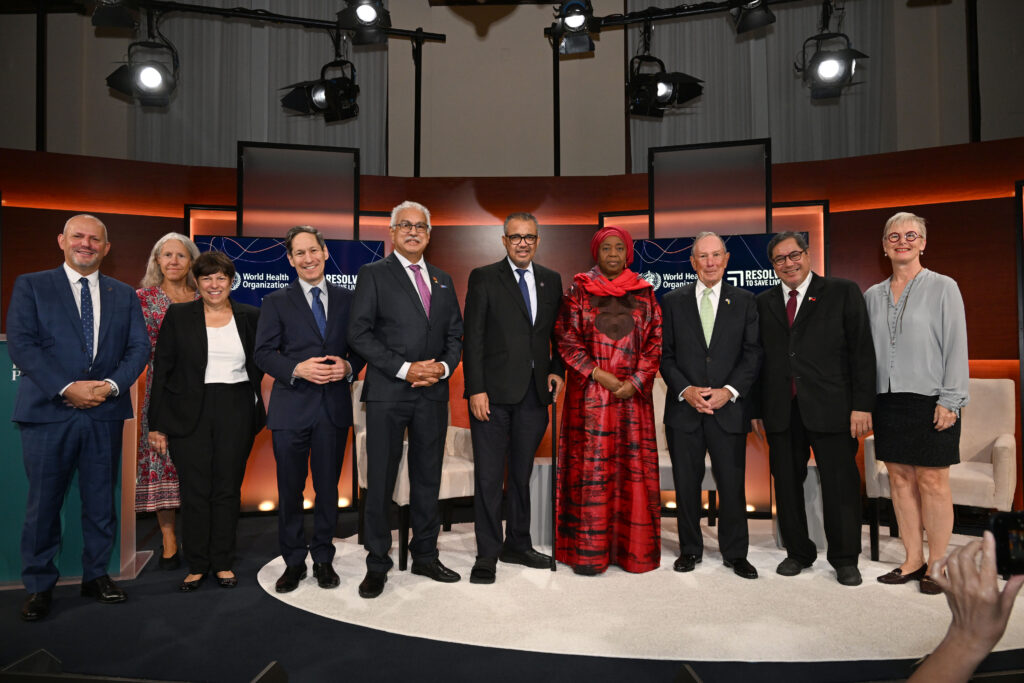
Read the report here.
First WHO report details devastating impact of hypertension and ways to stop it
NEW YORK, 19 SEPTEMBER 2023—The World Health Organization (WHO) released its first-ever report on the devastating global impact of high blood pressure, along with recommendations on the ways to win the race against this silent killer. The report shows approximately 4 out of every 5 people with hypertension are not adequately treated, but if countries […]
7-1-7 forms the bedrock of new WHO guidance
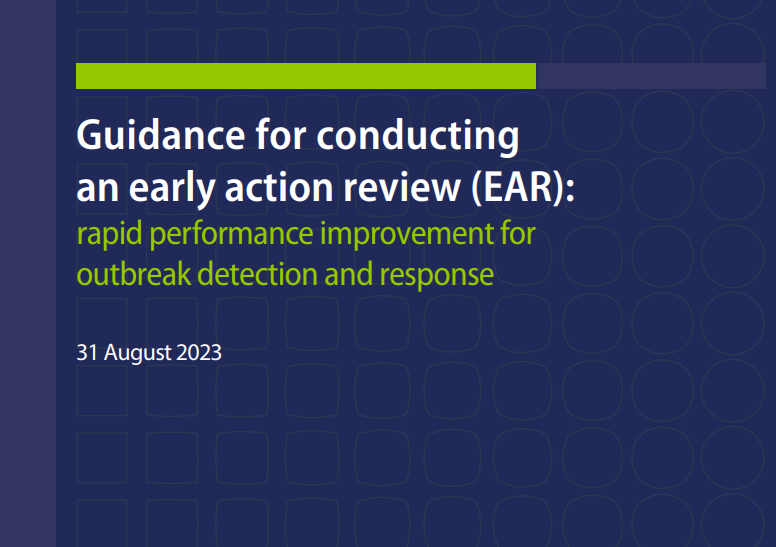
The World Health Organization’s new Guidance and tools for Conducting an Early Action Review (EAR) incorporate the 7-1-7 target for outbreak detection and control, which Resolve to Save Lives has piloted since 2021. EARs offer a performance improvement approach, which can be used for each outbreak to identify system-level bottlenecks and propose immediate and long-term […]